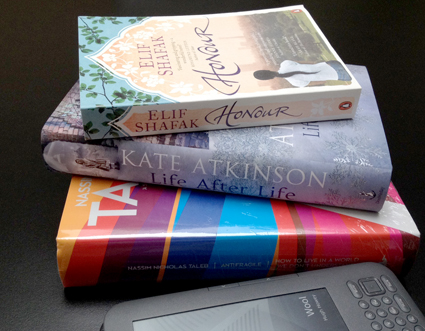Arthur C Clarke Award #6: 2312 by Kim Stanley Robinson
I have to admit that I haven’t read Kim Stanley Robinson’s fiction before and on the strength of 2312 I’ll read his Mars Trilogy, which established him as a big hitter, with a literary bent, in the realm of hard SF.
Truth is, I don’t really gravitate to other-world science fiction. I suppose because I’m mainly interested in social science fiction I’ve tended towards Earth-based scenarios. I’m now thinking I should reconsider this bias.
Kim Stanley Robinson’s 2312 is the sixth, and final, novel I’ve read on the shortlist for this year’s Arthur C Clarke Award. The winner will be announced tomorrow evening (1 May) at the Royal Society in London. And I’ll be there!
The main protagonist in 2312 is Mercury-born Swan Er Hong, a well-regarded designer of artificial worlds created in burrowed-out and terraformed asteroids. Of all Earth’s mammals, 92% are endangered and they mostly live in these off-planet asteroids, which conveniently double as interplanetary transport systems and food producers. Swan has shifted her career to landscape art with some performance art thrown in. I really dislike how Robinson gives generic terms for art installations and performances (goldsworthies and abramovics) based on two current artists – Andy Goldsworthy and Marina Abramovic.
But putting that aside, Robinson has written a humungous book and it’s set, time-wise, at a point in human history when the balance of power is shifting from Earth to Venus and the big moons. I always like a novel that’s sited at a cusp. And the action kicks in when the city of Terminator on Mercury is destroyed. Swan is distraught at the loss of her home and joins forces with Inspector Jean Genette to investigate the catastrophe, which has shocked Earth and all the colonies. This disaster comes shortly after the death of Swan’s grandmother, Alex, who leaves secret messages for Swan to deliver to Earth and Venus. It seems Alex, aged 191 years at her death, was the linchpin of a conspiracy spanning the Solar System.
So what’s happening back home? Well, Earth is almost ice-free; sea levels are 11metres higher. Manhattan is the new Venice.
No, Earth was a mess, a sad place. And yet still the centre of the story. It had to be dealt with, as Alex had always said, or nothing done in space was real.
And here’s Swan back on Earth:
She moved into the sun whenever she could. That was the direct radiation of Sol, slamming into her naked skin. It was amazing to stand in the light of the sun without dying of it. This was the only place in the solar system where that could happen…
Robinson has a terrific imagination and presents a range of worlds where gender is blurred and where individuals can chose to have brain implants – qubes – and all manner of add-ons. Swan is particularly addicted to these add-ons including one allowing her to trill bird-song. But I found her qube, named Pauline, quite irritating (as did Swan, for that matter).
I was surprised that Robinson left it quite late (20% into the ebook) to give a specific description of Swan, through the eyes of another character, Kirwan. By this point I already had a picture of Swan in my mind.
Robinson alternates chapters with short lists and extracts, a reasonable solution to the problem of giving readers the back story to the novel. I looked forward to these brief interludes and they helped to make this big book a bit more digestible. In parts, the novel rambles, with lengthy and sometimes repetitive dialogue. But 2312 takes you on a fascinating journey all the same.
So which author would I like to see win the Arthur C Clarke shortlist 2013 tomorrow evening?
Well they’ve all got pluses… so I’m going to sleep on this and tell you in the morning!





Trackbacks & Pingbacks
[…] Here are a few examples mentioned by the panelists and audience: Stars in My Pocket Like Seeds of Sand by Samuel R Delany. (Characters are ‘she’ until sexual attraction makes them a ‘he’.) Shadow Man by Melissa Scot. (There are five genders in this novel but only male and female are legal.) Mission Child by Maureen F McHugh And Salome Danced by Kelly Esridge (The reader does not know if the narrator is male or female.) The Female Man by Joanna Russ Peter Hamilton’s mainstream SF includes gender variance. Written on the Body by Jeanette Winterson, as a non-genre example. Changes, a short story by Neil Gaiman (in which people can switch gender using a recreational drug.) And I’ll add 2312 by Kim Stanley Robinson, which I reviewed here. […]
Leave a Reply
Want to join the discussion?Feel free to contribute!